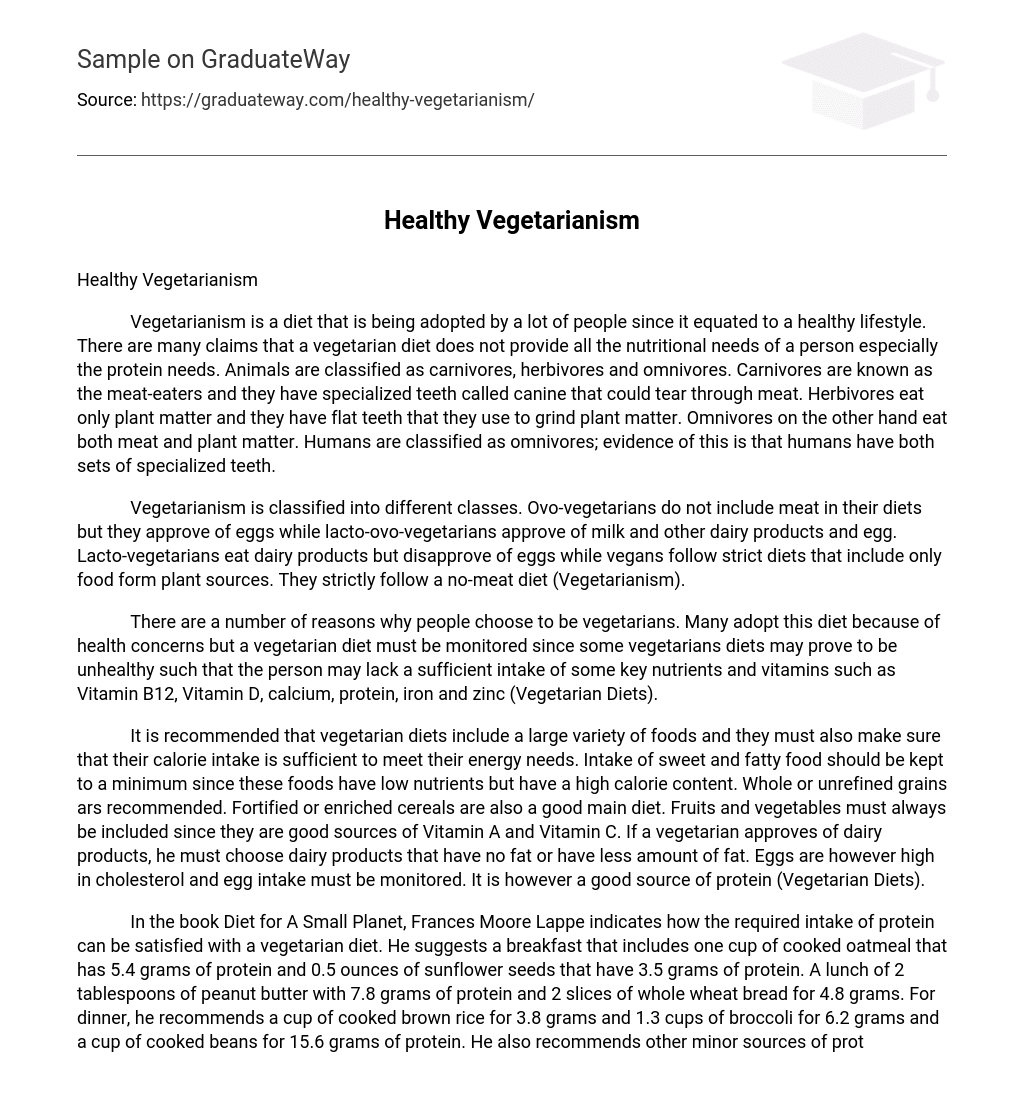Vegetarianism is a diet that is being adopted by a lot of people since it equated to a healthy lifestyle. There are many claims that a vegetarian diet does not provide all the nutritional needs of a person especially the protein needs. Animals are classified as carnivores, herbivores and omnivores. Carnivores are known as the meat-eaters and they have specialized teeth called canine that could tear through meat. Herbivores eat only plant matter and they have flat teeth that they use to grind plant matter. Omnivores on the other hand eat both meat and plant matter. Humans are classified as omnivores; evidence of this is that humans have both sets of specialized teeth.
Vegetarianism is classified into different classes. Ovo-vegetarians do not include meat in their diets but they approve of eggs while lacto-ovo-vegetarians approve of milk and other dairy products and egg. Lacto-vegetarians eat dairy products but disapprove of eggs while vegans follow strict diets that include only food form plant sources. They strictly follow a no-meat diet (Vegetarianism).
There are a number of reasons why people choose to be vegetarians. Many adopt this diet because of health concerns but a vegetarian diet must be monitored since some vegetarians diets may prove to be unhealthy such that the person may lack a sufficient intake of some key nutrients and vitamins such as Vitamin B12, Vitamin D, calcium, protein, iron and zinc (Vegetarian Diets).
It is recommended that vegetarian diets include a large variety of foods and they must also make sure that their calorie intake is sufficient to meet their energy needs. Intake of sweet and fatty food should be kept to a minimum since these foods have low nutrients but have a high calorie content. Whole or unrefined grains ars recommended. Fortified or enriched cereals are also a good main diet. Fruits and vegetables must always be included since they are good sources of Vitamin A and Vitamin C. If a vegetarian approves of dairy products, he must choose dairy products that have no fat or have less amount of fat. Eggs are however high in cholesterol and egg intake must be monitored. It is however a good source of protein (Vegetarian Diets).
In the book Diet for A Small Planet, Frances Moore Lappe indicates how the required intake of protein can be satisfied with a vegetarian diet. He suggests a breakfast that includes one cup of cooked oatmeal that has 5.4 grams of protein and 0.5 ounces of sunflower seeds that have 3.5 grams of protein. A lunch of 2 tablespoons of peanut butter with 7.8 grams of protein and 2 slices of whole wheat bread for 4.8 grams. For dinner, he recommends a cup of cooked brown rice for 3.8 grams and 1.3 cups of broccoli for 6.2 grams and a cup of cooked beans for 15.6 grams of protein. He also recommends other minor sources of protein such as mushroom, carrots, apples, raisins, fruit juice, honey and oil (White and Frank).
Vegetarianism may however not be a healthy diet for children. According to Professor Lindsay Allen, director of the US Agricultural Research Service’s Western Human Nutrition Research Centre at the University of California at Davis, not giving children meat during the crucial stages of development is unhealthy for them. Allen said that a no-meat diet for children causes permanent damage since meat provides Vitamin B12, calcium, zinc, Vitamin A and iron, which are crucial for growth and development. She explained that adults adopting vegetarian diets raise ethical and health concerns since adults have already passed the crucial stages of development. Also, adults can replace certain vitamin and mineral intake with supplements. Allen said that giving children supplemental nutrition is too risky (Roche, 2005).
In her study with 544 seven-year old children in Kenya over a two-year period, those children that ate meat had 80 percent increase in muscle mass and those that had milk had a 40 percent increase. They also showed higher mental development as they yielded higher test results (Roche, 2005).
Vegetarian diets have also become an issue for vegetarians since they have higher nutritional requirements. Such a diet may be healthy for pregnant weapon but they must consult a dietitian to ensure that they are getting all the nutrients that they need. In one study, German researchers discovered that pregnant women following a lacto-ovo-vegetarian diet showed low Vitamin B12 levels even if they ate eggs and milk. Vitamin B12 is important for a pregnant woman since it keeps her healthy during a pregnancy as well as keeping the developing child from developing spinal malformations (McVeigh, 2005). It may be noted that B12 is only found in meat sources. Scientists have also discovered that even people not following a vegetarian diet showed a deficiency of Vitamin B12 (Kirchheimer, 2003).
Vegetarianism may be a healthy diet since it may reduce the potential of developing certain illnesses. More and more people are adopting this diet. However, extra-precaution must be taken since monitoring the diet of a vegetarian is crucial so that it may be ensured that he/she is receiving a sufficient intake of nutrients. This is extremely important especially for young people and pregant women who are vegetarians. A vegetarian diet may be a diet as healthy as a diet containing milk but for it to be a healthy planning, it must be planned and consideration must be taken so that the person will have a sufficient intake of necessary vitamins and minerals.
References
Vegetarianism. KidsHealth. Retrieved July 31, 2008, from http://kidshealth.org/parent/nutrition_fit/nutrition/vegetarianism.html
Vegetarian Diets. American Heart. Retrieved July 31, 2008, from http://www.americanheart.org/presenter.jhtml?identifier=4777
White, Randall & Frank, Erica. Health Effects and Prevalence of Vegetarianism. p.465. Retrieved July 31, 2008, from < www.pubmedcentral.nih.gov/articlerender.fcgi?artid=1022500>
Roche, Ansley. 24 February 2005. Teaching Children Not to Eat Meat: Healthy or Unethical?. Healthy Living. Retrieved July 31, 2008, from http://www.healthylivingnyc.com/article/117
Kirchheimer, Sid. 18 June 2003. Vegetarian Diet and B12 Deficiency. WebMD. Retrieved July 31, 2008, from http://www.webmd.com/diet/news/20030618/vegetarian-diet-b12-deficiency





